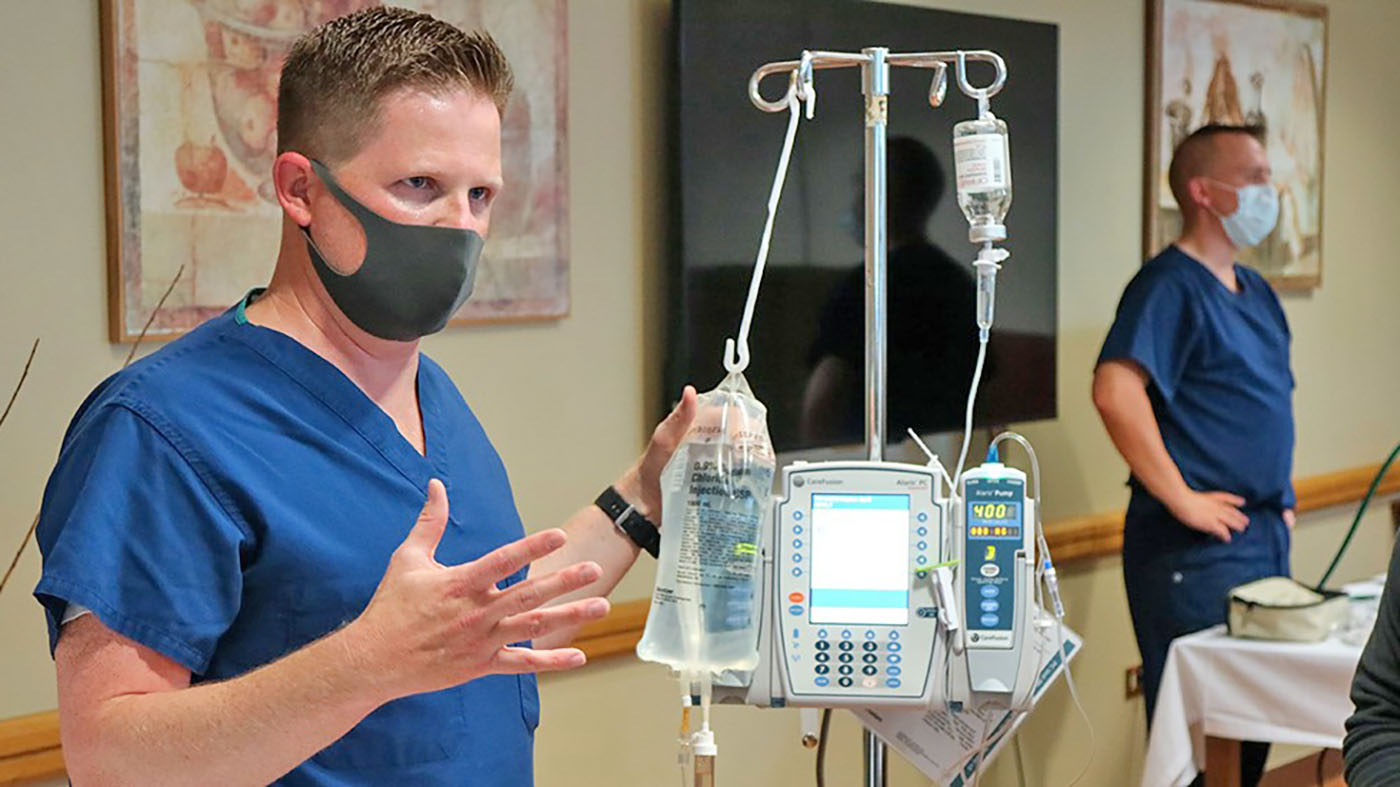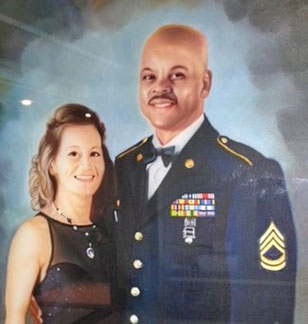For retired Army Sergeant First Class Darryl Myers, who was diagnosed with two life-threatening diseases, VA offered more than best-in-class medical care and cutting-edge treatments. It offered a collaborative system of support for he and his family.
Myers was diagnosed with both the blood cancer multiple myeloma and amyloidosis, a rare condition where abnormal proteins build up in different parts of the body, potentially causing problems in how those organs work. VA quickly put together a team to discuss the unique nature of his case and develop a personalized treatment plan.
Myers gained valuable knowledge from his work in human resources at Walter Reed National Military Medical Hospital, which helped him understand survivorship benefits and become comfortable engaging with medical staff. However, when he faced immense health struggles following his own diagnosis, there were moments when he couldn’t advocate for himself. He required personalized medical care, wellness resources and dedicated caregiver support—exactly the kind of assistance VA recognizes as crucial in cancer care.
Harnessing VA’s collaborative expertise
One of the standout features of VA cancer care is the emphasis on multidisciplinary collaboration. VA routinely brings together medical professionals from various fields, including oncologists, hematologists, radiologists and surgeons to develop comprehensive treatment plans. This multidisciplinary approach makes sure Veterans receive well-rounded care that considers all aspects of their cancer journey.
Further building on VA’s commitment to best-in-class care, VA teamed up with the Leukemia & Lymphoma Society this year to improve care for Veterans. This partnership means more funding for better treatments, support and research, ultimately helping Veterans in their fight against blood cancers.
Myers’ story highlights the importance of collaboration, as his medical team worked seamlessly across departments and even with external institutions like the Mayo Clinic. He credits Dr. Suman Kambhampati, his provider at Kansas City VA, for orchestrating his treatment plan and maintaining a collaborative spirit. “He and the Mayo Clinic, one of the leading institutes for amyloidosis, really listened to each other. Dr. Kambhampati is a true advocate and extremely knowledgeable,” Myers said.
Hope, resilience and VA’s dedication to best-in-class cancer care
Myers, who is now in maintenance therapy for both of his diagnoses, was characterized by his VA provider as having been in a near death situation, especially as his lethal disease involved multiple organs. Yet, with the superb collaboration of VA and the Mayo Clinic, led by world-renowned expert of amyloidosis Dr. Morie Gertz, this team of doctors and allied professionals were able to save his life.
Myers notes a bright point that emerged from enduring his many health struggles: building a new sense of empathy for his fellow Veterans. “It gives me a perspective now when I see Vets at VA. I’m able to have a connection with them. I tell them to ‘keep fighting, stay strong and never lose hope.’ If you lose hope, you lose life,” he said.
Myers’ journey and VA cancer care serve as beacons of hope and resilience. VA remains committed to providing Veterans with blood cancer and other forms of cancer with the best possible care and support they earned and deserve.
VA is observing National Blood Cancer Awareness Month. It’s important that Veterans are aware of their cancer care options at VA. Blood cancers—including lymphoma, Hodgkin lymphoma, non-Hodgkin lymphoma, myeloma and leukemia—make up 11% of all diagnosed cancers among Veterans enrolled in VA.
VA’s National Oncology Program (NOP) addresses the unique needs of Veterans with blood cancer or conditions such as amyloidosis and other forms of cancer. NOP follows a holistic approach that focuses not only on medical treatments but also on providing emotional support, resources and guidance throughout every step of a Veteran’s cancer journey.
Learn more about cancer care at VA
Veterans are strongly encouraged to talk to their VA provider about the need for different cancer screenings and what screening options are available.
VA offers several clinical pathways for certain types of blood cancers, which ensure that each Veteran receives personalized and evidence-based care tailored to their specific condition. Visit VA’s Clinical Pathways to learn more.
To learn more about cancer care at VA, visit cancer.va.gov. Visit My HealtheVet to learn tips and tools to help you partner with your health care team, so together you may work to manage your health.
Topics in this story
More Stories
Study underscores important role COVID vaccination can have in protecting Veterans from infection and reducing long-term health consequences
Columbia VA’s robotic surgery teams completed their 800th robotic surgery and are on schedule to hit 1,000 by the end of the year.
In a decentralized clinical trial, Veterans can participate from their own homes or local VA instead of having to travel to a research site.








What a amazing and informative article on my cousin Darryl. We are so proud of how he has approached these 2 cancers with courage and grace. I spoke to him recently and his spirits are up and his deamenor is calm and balanced. I know first hand how wonderful VA is when my brother almost died because of kidney failure and with the care and attention from the VA Hospital in Washington DC he was saved. They called my sister and I daily when he was in ICU to update us on his condition. No hospital does this but VA does!!! My congratulations to you and my dear cousin Darryl.
❤️